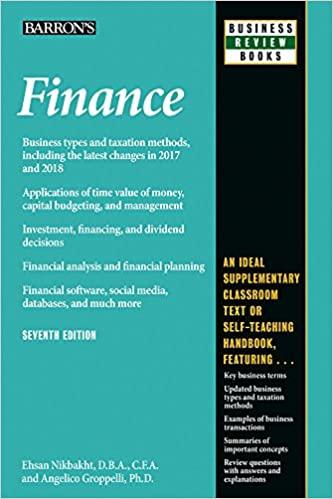Question
Stock repurchases occur when a company buys its outstanding stock which is often referred to as treasury stock and is reported as a negative value
Stock repurchases occur when a company buys its outstanding stock which is often referred to as treasury stock and is reported as a negative value on the companys balance sheet.
In a share repurchase, firms use excess cash to buy shares back from investors. These shares are to be held in the corporate treasury and resold if the company needs money. There are several approaches to conducting share repurchases.
Consider the following situation:
The firm repurchases shares from a major shareholder through privately determined discussions.
What method is described in the preceding situation?
a) Tender offer
b) Auction
c) Direct negotiation
d) Open-market transaction
In a taxless world with no brokerage costs, repurchases and dividends have the same effect on shareholder wealth. In the real world, however, repurchases provide more preferable tax treatment than dividends to ordinary investors. Does this mean that firms should always use share repurchases so that investors can gain from this tax benefit?
a) no
b) Yes
If you were to look at a firms cash distributions to its shareholders over time, which method of cash distribution is more likely to be used if the firm experiences volatile business cycles?
a) The use of stock repurchases
b) The payment of cash dividends
Step by Step Solution
There are 3 Steps involved in it
Step: 1

Get Instant Access to Expert-Tailored Solutions
See step-by-step solutions with expert insights and AI powered tools for academic success
Step: 2

Step: 3

Ace Your Homework with AI
Get the answers you need in no time with our AI-driven, step-by-step assistance
Get Started


